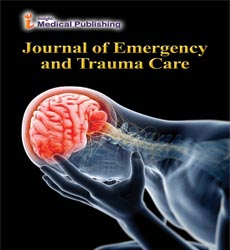Wunderlich Syndrome - A Rare Cause of Hypovolemic Shock- Case Report
Abstract
Retroperitoneal haemorrhage (Wunderlich syndrome) is a rare cause of hypovolemic shock in emergency patients; however, it is associated with a high morbidity and presents a diagnostic challenge in the Emergency Department. It is more common in female patients older than 50 years, and one of the leading causes is a benign renal tumour angiomyolipoma (AML). Angiomyolipoma predominantly affects only one kidney. Bilateral AML is strongly associated with a rare autoimmune disorder-tuberous sclerosis and occur in 80% of cases of TS. Symptoms caused by growing renal AML are absent to mild and non-specific (intermittent loin, lower back pains, haematuria). Rupture with retroperitoneal bleeding is a frequent complication of AML and occurs in 20% of all cases. Initial presentation of retroperitoneal haemorrhage is remarkably similar to a ruptured abdominal aortic aneurysm (AAA). Most of the cases remain clinically silent during the growth phase and present to the hospital with a complication in the form of retroperitoneal bleeding. Risk of bleeding increases with the size of the tumor and AML bigger than 4cm are treated with selective embolization if found on routine scanning. Many cases of AML are diagnosed when a patient is being scanned for other medical problems. Even in an emergency when AML ruptures is still possible to treat it either with selective embolization or selective nephrectomy, and the majority of patients are making a successful recovery.
Open Access Journals
- Aquaculture & Veterinary Science
- Chemistry & Chemical Sciences
- Clinical Sciences
- Engineering
- General Science
- Genetics & Molecular Biology
- Health Care & Nursing
- Immunology & Microbiology
- Materials Science
- Mathematics & Physics
- Medical Sciences
- Neurology & Psychiatry
- Oncology & Cancer Science
- Pharmaceutical Sciences
